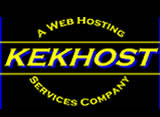Copyright and Trademark Guide
Posted: May 14th, 2018
Notice of Allegedly Infringing Copyrighted Material
The following guidelines set forth KEK Technology Inc.'s process for responding to DMCA take-down notices. These guidelines outline KEK's steps for removing, or disabling access to, infringing material of which KEKhost/KEKhosting or partner has been made aware through third-party notices that conform to the DMCA. Our company reserves the right to modify these guidelines in a particular situation given other business demands. These guidelines are not to be construed as legal counsel and as such are advised to seek advice from qualified legal counsel if you require it.
Copyrighted Material Takedown Process
1) KEK Technology Inc. (KEKhost/KEKhosting) receives a notice from owner of content (“Owner”) alleging a violation of the DMCA (“DMCA Notice”).
2) KEKhost/KEKhosting Abuse and Security Management will determine if the DMCA Notice complies with the DMCA by reviewing the DMCA Notice to ensure that it contains substantially all of the following (but at a minimum the items in (1) through (3)) for the notice to be DMCA compliant:
1) Identification of the copyrighted work claimed to have been infringed, or, if multiple copyrighted works at a single online site are covered by a single notification, a representative list of such works at that site.
2) Identification of the material that is claimed to be infringing or to be the subject of infringing activity and that is to be removed or access to which is to be disabled, and information reasonably sufficient to permit KEK Technology Inc. to locate the material.
3) Information reasonably sufficient to permit Internap to contact the Owner, such as an address, telephone number and, if available, an electronic mail address at which the Owner may be contacted.
4) A physical or electronic signature of the Owner or a person authorized to act on behalf of the Owner.
5) A statement that the Owner has a good faith belief that use of the material in the manner complained of is not authorized by the Owner, its agent or the law.
6) A statement that the information in the notification is accurate, and under penalty of perjury, that the complaining party, if not the Owner is authorized to act on behalf of the Owner.
3) If KEKhost/KEKhosting determines that the notice complies with the DMCA iWeb will then forward the notice to the responsible customer ("Customer"). If the DMCA Notice does not substantially comply with the DMCA then KEKhost/KEKhosting will notify the Owner that the DMCA Notice is not compliant with DMCA notice requirements.
4) Upon forwarding the DMCA Notice to Customer an automatically generated response will be sent to the Owner indicating it has been forwarded without identifying the Customer.
5) Upon receipt of the forwarded notice, Customer must promptly:
1) remove or disable all access to the allegedly infringing material and
2) reply to the forwarded notice to inform KEKhost/KEKosting that the material has been disabled.
Copyrighted Material Counter Notification Process
This process is performed by the customer directly with the Copyright Owner. If Customer sends to Copyright Owner a counter notice to the DMCA Notice (“Counter Notice”) then Customer may reverse the removal of material or cease disabling access to the material 10 business days following the counter notice unless Owner notifies Customer within those 10 business days that it has filed an action seeking a court order to restrain Customer from engaging in infringing activity relating to the material. Customer may not reverse the removal of material or cease disabling access to the material after 14 business days.
A Counter Notice must contain all of the following for the Counter Notice to be DMCA compliant:
1) Identification of the material that has been removed or to which access has been disabled and the location at which the material appeared before it was removed or access to it was disabled;
2) A statement under penalty of perjury that the Customer has a good faith belief that the material was removed or disabled as a result of mistake or misidentification of the material to be removed or disabled.
3) The Customer’s name, address and telephone number, and a statement that the Customer consents to the jurisdiction of Federal District Court for the judicial district in which the address is located, or if the Customer’s address is outside of the United States, for any judicial district in which KEKhost/KEKhosting or partner may be found, and that the Customer will accept service of process from the Owner or its agent.
4) A physical or electronic signature of the Customer.
Trademarked Material Takedown Process
1) KEK receives a notice from the owner of the trademark alleging a violation of their trademark.
2) KEK will then forward the notice to the responsible customer ("Customer").
3) Customer must then, without delay, remove the material described in the notice from KEK Technology or its partner's network entirely including but not limited to:
1) remove hosted material such as text, images or other files said to be infringing,
2) all DNS services hosted on KEK/partner's network for any domain names that are infringing on Owner's trademark and
3) all DNS records that point to KEK/partner's network for any domains that are infringing where that DNS is hosted outside of KEK/partner's network.
